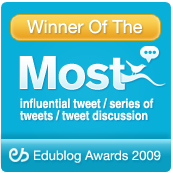 It has been quite awhile since I have written a post. I think I might be in a state of depression as a result of my addiction to television News shows and the recent development of an affliction that I refer to as “screen screaming”. Getting beyond the political turn of events of recent history, I also find myself frustrated and depressed over the slow pace of change in education that we have witnessed since the turn of the century. Why is it that so much of what education thought-leaders have been advocating for, in order to dramatically change the education system for the better, has yet to take root in any significant way? Many of the practices that have been identified as stymieing the system are still common practice in too many school systems today.
It has been quite awhile since I have written a post. I think I might be in a state of depression as a result of my addiction to television News shows and the recent development of an affliction that I refer to as “screen screaming”. Getting beyond the political turn of events of recent history, I also find myself frustrated and depressed over the slow pace of change in education that we have witnessed since the turn of the century. Why is it that so much of what education thought-leaders have been advocating for, in order to dramatically change the education system for the better, has yet to take root in any significant way? Many of the practices that have been identified as stymieing the system are still common practice in too many school systems today.
The big question that educators often ponder seems to be: In this age of technology and innovation does technology improve student learning? Of course that is a big question with research supporting both sides of the argument. I think however that there are other questions, which must be answered in order to gauge the effects of technology our education system.
My first question is: What has technology affected in the everyday lives of educators and support staff that improves their conditions? I tend to use my own experience and observations in addressing this since I began teaching in the early 70’s, before any real significant influence of technology on education, calculators not withstanding. Tech has certainly improved and simplified the ability to record data over the years, freeing up time for teachers. Of course that free time might be lost if teachers are loaded up with new additional stuff to record on students. Tech has given educators an ability to increase their connections with other educators through social media and collaborative applications to exchange ideas and share sources. Certainly this collaboration could be a positive influence and a great source of professional development if promoted and supported by an innovative and creative administration. It is impossible to get “out-of-the-box” teaching and learning when teachers are restrained by “in-the-box” management.
Technology has changed the dynamic of curating information for teachers and students. It gives access to information never before so readily available, or so easily curated. Technology also enables users the ability to publish acquired information in various formats for consumption by others. Additionally, it offers a means in many cases to analyze data in ways that could not be done so easily before technology had become so ubiquitous.
Communication has been upended by technology. There are many ways for people to communicate. We have gone way beyond the dial up telephone. Not only can we communicate with voice, but we can also transmit documents, files, videos, audio files, and live streaming. Gutenberg and Bell would most certainly be impressed.
Access to all of these wonders of technology requires a different mindset than that of the early 20th century. It requires the ability to be flexible and adapt to the constant changes that come with technology. It requires one to commit to being a lifelong learner. It also requires a strict adherence to critical thinking in order to recognize, that which offers value from that which is crap.
Now let us consider what teachers need to survive and thrive in their world today in order to be relevant to their students in what they must teach and the methods they use in the time that they have to deal with their students. Technology affords them time-saving methods to deal with the required bureaucratic minutia. It also offers the ability to maintain relevance in the tech-driven, fast-paced, changing environment of information exchange. Access to information at anytime is also a tech-added benefit for teachers. 24/7 communication access can also benefit educators accessing their administrators, collegial sources, students, or parents.
Now let us consider what students will need to know in order for them to survive and thrive in the technology-driven world that they will occupy, as opposed to the world that their educators grew up in. We want kids to be able to communicate, collaborate, curate, critically think, and most importantly create while using Reading, Riting, and Rithmetic.
All of this is now happening and will continue to happen in a world that is technology driven. We do not get any say in how much technology will continue to change and drive change. We can only prepare for the inevitable change by developing a generation of flexible life long learners who can assess and adapt to new information.
If my observations are even somewhat accurate, why is our education system so slow in developing methodologies that are supportive of teachers learning and using technology with their students? Why aren’t educators learning along with their students the very things they were not exposed to as they grew and learned? Why are we not concentrating more on student-centered learning, as opposed to Teacher-driven teaching? Why are we not focusing more on collaborative learning as opposed to lecture and direct instruction? Why aren’t districts more in tune with supporting collaborative learning for their teachers in obtaining relevant professional development to teach kids for their own future?
Well, now that I sat down to write something on education, I find myself again screen screaming, but this time it has nothing to do with partisan politics. I guess the idea of comfort zones, traditions, and closed mindedness are just as frustrating when we recognize where we should be going, but only a few are willing to take a chance on innovation. Maybe politics and education have more in common than I thought. Just because you have always done it one way doesn’t mean it must continue that way. When the world around you changes, pay attention. If we are going to better educate our kids, we must first better educate their educators.











